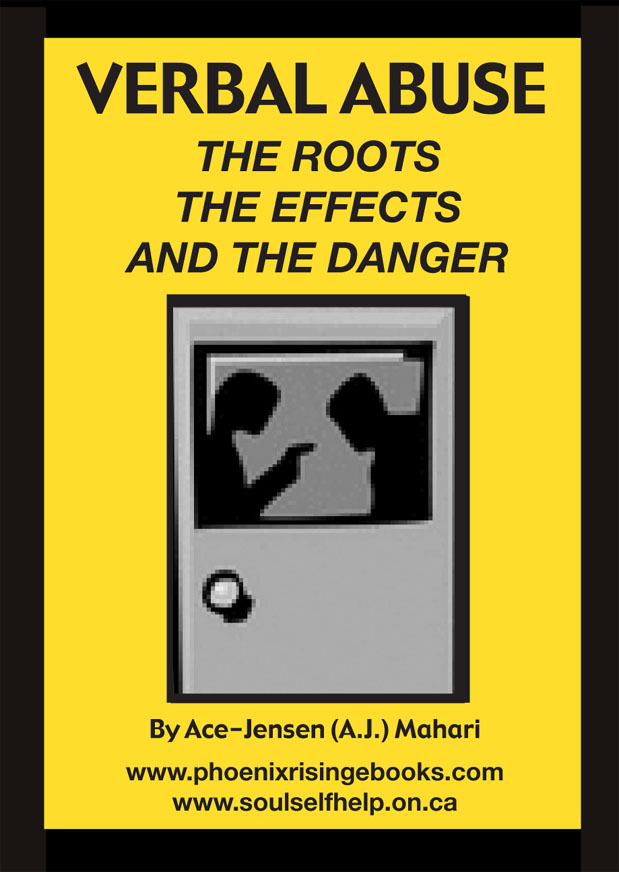The Roots, Reality, and Proliferation of Verbal Abuse
by A.J. Mahari
January 22, 2007
Verbal abuse has its roots in the ever-deepening
narcissism of humanity and its central reality in the breakdown of the family since the days of the "me generation".
Verbal abuse is insidious, pervading and rampant in our increasingly narcissistic culture. Verbal abuse, like emotional abuse,
physical abuse, sexual abuse, and domestic violence or woman abuse, is dangerous and needs to be recognized as the abuse that
it is and taken very seriously.
"If it feels good, do it" Ė is the heathen mantra of those who have failed to emotionally mature beyond childhood.
The reality that more and more people are only getting out of childhood chronologically, and not emotionally, as age-appropriate maturing
adults, is witnessed in and evidenced by the growing narcissistic culture that is permeating humanity world-wide in this young century.
Verbal abuse is rampant. Verbal abuse, sadly, all-too-often has become the norm, not the aberration. From a television show like
Jerry Springer, upon which it is hard to find a guest that isnít verbally abusive, to cell phones with cameras and video cameras that are
everywhere showing us 24/7 on cable news networks everywhere how impulsive humanity has become, verbal abuse threatens to be
so common-place as to be taken for granted.
Even with all this wide-spread and continually proliferating public verbal abuse it seems we, as a species, arenít paying near enough
attention to the intimate verbal abuse that is exploding in relationship after relationship in moderate suburban homes and expensive
homes everywhere.
What has happened and/or continues to happen to the previously stalwart family as an institution. A sociological adjunct, if you will,
to the devil-may-care 'education' acquired all-too-often on the streets, from peers, and via media outlets on television and increasingly
on the internet.
Who is teaching your children? Is someone yelling and screaming in your house? In an ever-increasing number of homes that house toxic
dysfunctional relationships, more and more children are being raised in environments in which verbal abuse is as commonplace as the
household furniture. It is becoming more the norm than the problem for a growing number in society today.
Verbal abuse is a burdensome legacy passed down through the generations in many families. If mom or dad was prone to rage,
name-calling, screaming, put-downs, and verbally controlling warfare and the costs be damned chances are that little Mikey or Sally
are going to think thatís how to handle their feelings too..
Intimate verbal abuse is one of the most damaging forms of abuse.It changes who people are. It is intimidating, controlling, deflating,
exhausting, and simultaneously feared and accepted.
More victims of verbal abuse, than not, truly believe and feel that they are to blame for the odious obnoxious and violent verbiage
virulently thrust upon them -- and they are NOT to blame.
Sadly, for so many people, verbal abuse has become the norm in their experience. Frustrated, unhealthy, stressed out, and
narcissistically toxic contemporaries and/or family members have come to believe that being verbally abusive is okay. They have
come to believe that it is better than being abusive in other ways.
They fail to realize the seriousness of it and the reality that verbal abuse is often the precursor to other forms of abuse and that it often is paired
with emotional and psychological abuse.
The emotional carnage of the intimate verbal abuser is feeding upon its victims privately and not publicly.
Are we paying attention? Are we getting it yet? Do we care? Or are we getting way to used to it? Has it already become way to commonplace?
Verbal abuse is verbal battery. Those who use words to abuse are emotional batterers.
I wonder how many of us grew up with a parent or both parents whose words would cut through us as sure and as easily as a knife cuts through butter.
Yet, we were told to get over it, to deal with it, that we were too sensitive. Or we were told that Dad had a hard day at work, Momís got a headache, and so
if he/she yells and calls us names they just donít have the patience for our blameworthy and defenceless little carcasses this evening?
Verbal abuse often has its legacy in our childhoods. If we grew up being screamed at, put down, criticized and otherwise verbally abused
we are more likely to find ourselves with a friend or lover who treats us the same way. It isnít pleasant and it hurts, but, it is familiar. Sadly, we can
get so tied to the familiar.
How many of us grew up in atmospheres of verbal abuse as children and up to some point in our lives were verbally abusive because we really
didnít know better? It happens, it really does.
This, however, is not an excuse or justification. Each and every one of us has an obligation to ourselves and to humanity to recover, heal, and/or
evolve beyond all that we may have been wounded with and/or by in childhood. That's what being an emotional adult really is about - personal
responsibility no matter what.
That said, the truth is, many who abuse now, were abused in childhood. Not an excuse, not a justification, but a relevant fact.
A fact that should give long pause to anyone, verbally abusing, or being verbally abused anywhere near a childís precious ears lest a new legacy of abuse be born.
Verbal abuse, like many other forms of abuse, usually doesnít just come out of the clear blue sky. I believe that abusers are made, not born.
© A.J. Mahari January 22, 2007
© 2007 MS. A.J. Mahari
Last updated March 15, 2007



